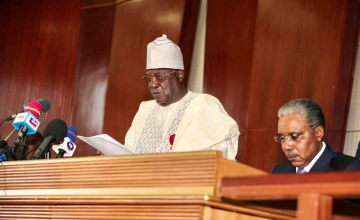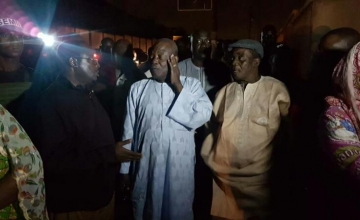
In a statement (document S/PRST/2020/5) issued by China’s Zhang Jun, Council President for March, the 15-member organ underlined the importance of prompt and effective implementation of its resolutions dealing with terrorism, including sanctions aimed at Islamic State in Iraq and the Levant (ISIL/Da’esh), Al-Qaida and their affiliates.
“The Security Council calls on the international community to strengthen its political commitment and to consider mobilizing more sustainable and predicable resources and expertise to strengthen the capacity of African countries in countering terrorism and violent extremism conducive terrorism,” the statement said.
To that end, the Council specified areas in which the international community can support African countries, including through stronger inter-agency cooperation, the sharing of good border security practices, developing fair and effective criminal justice systems, preventing the acquisition of weapons by terrorists, and both developing and implementing plans to respond to terrorist attacks on critical infrastructure.
The Council emphasized that Member States must ensure that counter-terrorism efforts comply with their obligations under international human rights, refugee and humanitarian law, as a failure to do so contributes to radicalization.
In her briefing, Rosemary DiCarlo, Under-Secretary-General for Political and Peacebuilding Affairs, warned that Al-Shabaab poses the most persistent threat to security in Somalia and East Africa, despite recent military operations launched against the group. Islamic State in Iraq and the Levant meanwhile continues to carry out activities in Libya and empower affiliates in eastern, southern and central Africa. The result is the terrorizing of local populations, especially women. “Just as misogyny is at the heart of so many terrorist-group strategies, so must women be at the centre of our responses,” she said, calling for greater multilateral cooperation, notably the sharing of best practices and resources.
In similar vein, Fatima Kyari Mohammed, Permanent Observer of the African Union, said terrorism and violent extremism are assuming unprecedented scales of expansion and intensity. In addition to the Sahel, Lake Chad Basin and Horn of Africa, terrorism is now spreading to parts of Africa that had been spared that menace. “We cannot ignore the fact that these regions are at war today — a real war in which dozens of soldiers and civilians die almost every week,” she said. A greater focus must be placed on prevention, root causes and understanding why young people join terrorist groups or espouse extremist views.
On that point, Abdoulaye Mar Dieye, Special Adviser to the Administrator of the United Nations Development Programme (UNDP), said his office invests heavily in research and evidence-based programming in order to help prevent the rise of violent extremism. UNDP has interviewed hundreds of former members of terrorist and extremist groups to better understand what drives recruitment and found that over half of them were dissatisfied with their economic situation. More than three quarters of those interviewed said they had “zero trust in politicians or in law enforcement institutions”. Addressing these root causes would bring dividends, he assured, noting that funds directed at prevention are more effectively spent than simply responding to crises as they happen.
In the ensuing debate, delegates underscored the significant threat posed by terrorism on African communities and institutions. Efforts to date are insufficient, several speakers warned.
Nigeria’s representative described African anti-terrorism efforts as fragmented, military-oriented and incommensurate with the scale of the threat. The criminal-justice response remains weak, law enforcement agencies face capacity constraints and courts in many countries are hard-pressed to deal with the number of persons disengaging from terrorist groups, he said, emphasizing: “Simply restoring social, political and economic structures to pre-conflict levels will not lead to sustainable long-term solutions.”
Omar Hilale of Morocco said terrorism is one of the most serious threats to international peace and security and fulfillment of the Sustainable Development Goals. Terrorist operations in Africa are increasingly audacious in attacking infrastructure, such as schools. Noting that separatists and non-State armed groups represent a genuine threat to peace and security, he expressed concern over the growing closeness of Al-Qaida and ISIL/Da’esh in the Sahel, as they engage in joint operations, raising cause for alarm. Terrorists aim to incite violence, creating a vacuum to be exploited for their own ends.
Separatists in Cameroon have been fighting for the independence of the predominantly English-speaking North West and South West Regions, forcing educational and economic activities to grind to a slow.














